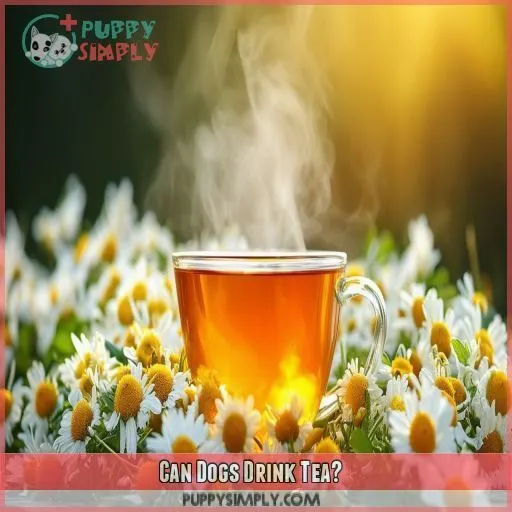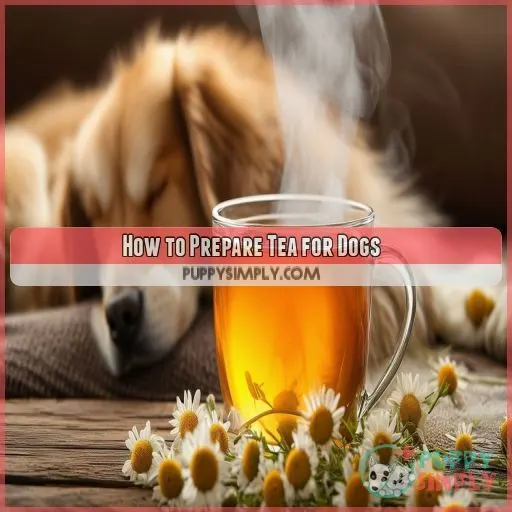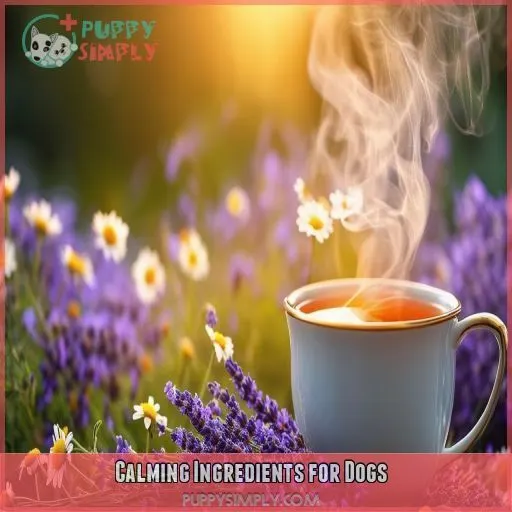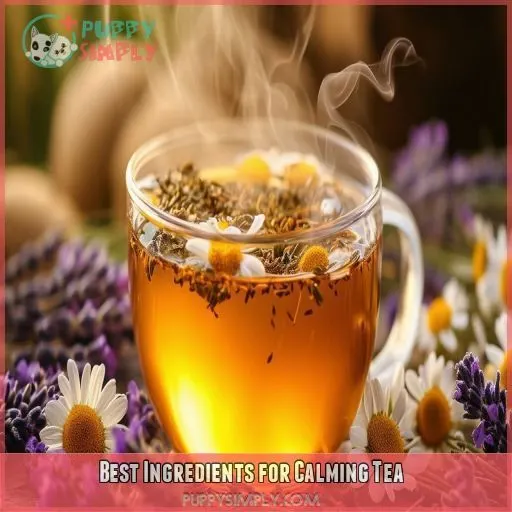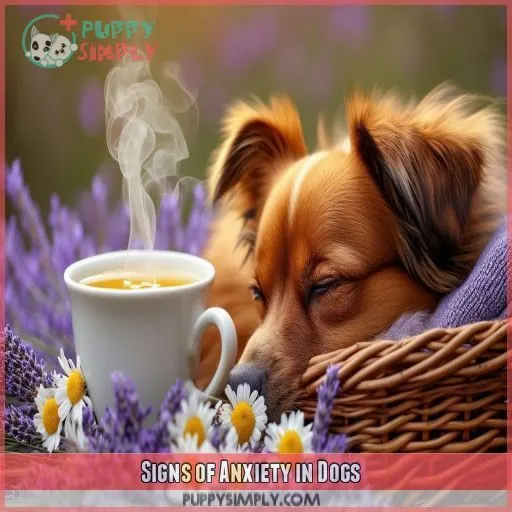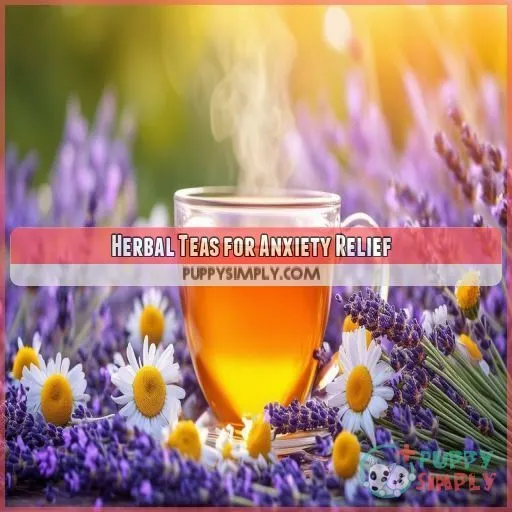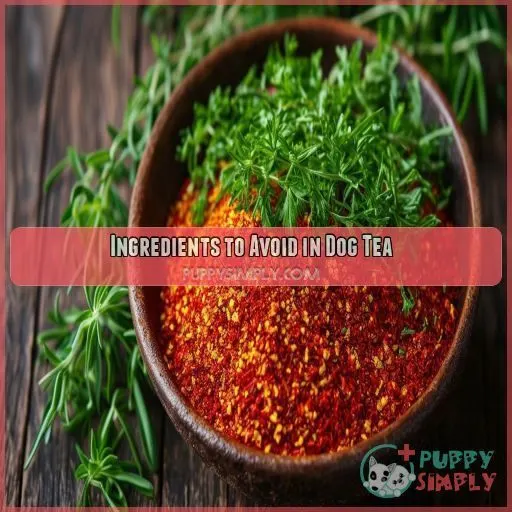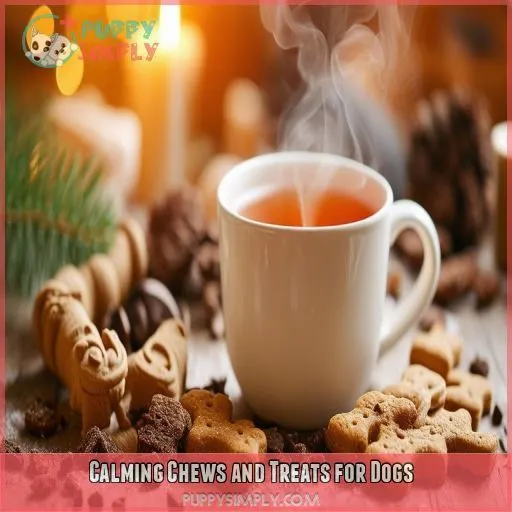This site is supported by our readers. We may earn a commission, at no cost to you, if you purchase through links.
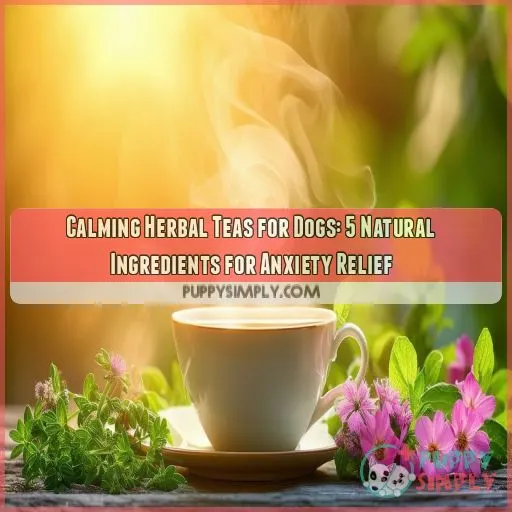
Is your furry friend feeling anxious or stressed? Do you want to help them relax and unwind? Herbal teas can be a great way to calm your dog’s nerves.
Some popular calming herbal teas for dogs include chamomile, lavender, and valerian root. These teas have natural calming properties that can help soothe your dog’s anxiety and promote relaxation.
Here are some tips to keep in mind when giving your dog herbal tea:
- Always consult with your vet before introducing new supplements, including herbal teas, to your dog’s diet.
- Start with small amounts to ensure your dog can tolerate the tea.
- You can add the tea to their food or water, or even use it as a calming treat.
Table Of Contents
Key Takeaways
- Dogs can drink tea, but it has to be caffeine-free herbal tea, and even then, it’s best to consult a veterinarian first.
- Calming herbal teas like chamomile, lavender, and valerian root can help soothe your dog’s anxiety and promote relaxation.
- Brewing and serving are simple, but you should be mindful of the amount you give your dog based on their weight.
- There are natural ingredients like ashwagandha, chamomile, and valerian root that can help reduce stress and anxiety in dogs without making them drowsy.
Can Dogs Drink Tea?
You might be wondering if it’s safe to share your favorite brew with your furry friend. Well, the good news is, yes, dogs can drink tea! But there’s a catch – it has to be the right kind of tea.
Herbal teas, which are naturally caffeine-free, offer a range of benefits for our canine companions, from soothing anxiety to boosting their health. But before you brew a cup for your pup, there are a few important things to keep in mind.
Benefits of Herbal Tea for Dogs
You may be wondering, "Can my dog drink tea?" The answer is yes! Dogs can safely sip on caffeine-free herbal teas, and they offer a range of benefits for our furry friends. Here are some advantages of treating your pup to a cuppa:
- Natural Calming Agent: Herbal tea is packed with antioxidants and nutrients that can help ease anxiety and stress in dogs.
- Digestive Aid: Certain herbs can soothe upset stomachs and aid digestion, keeping your dog’s tummy happy.
- Healthy Coat: Some teas may even promote a shiny, healthy coat and fresh breath.
- Natural Flea Repellent: Herbal teas with peppermint can help ward off those pesky fleas.
Importance of Caffeine-Free Teas
Yes, dogs can sip tea, but it’s important to choose caffeine-free options. Here’s why:
| Caffeine-Free Teas for Dogs | Benefits |
|---|---|
| Herbal teas provide | Antioxidants and nutrients |
| Caffeine is | Toxic to dogs |
| Always | Consult your vet first |
Caffeine is a big no-no for dogs, but herbal teas offer a calming, healthy sip for your pup.
Consultation With a Veterinarian
While herbal tea can be beneficial for dogs, it’s important to talk to your veterinarian first. They’ll help you make sure it’s safe and works well for your dog’s specific needs. This is especially important if your dog has any health issues or is taking medication.
How to Prepare Tea for Dogs
Now that you know about the benefits of herbal tea for your furry friend, let’s get into the specifics of how to prepare it. We’ll cover the basics of brewing and serving, as well as some important dos and don’ts to keep in mind.
Brewing and Serving Herbal Tea
Brewing herbal tea for your dog is simple. Use 1 tea bag or 1 teaspoon of loose tea per cup of water. Boil the water and pour it over the tea leaves. Let it steep for around 5 minutes, then cool it to room temperature before serving.
Appropriate Amounts for Dog Size
Serving sizes depend on your dog’s weight. Here’s a general guide:
- Small dogs (under 25 lbs): Start with 1/4 cup of tea and adjust as needed.
- Medium dogs (25-50 lbs): Offer 1/2 cup of tea, increasing or decreasing the amount based on their response.
- Large dogs (50-100 lbs): Go for 3/4 cup of tea, tailoring the amount to their individual needs.
- Extra-large dogs (over 100 lbs): Offer 1 cup of tea, being mindful of any adjustments required.
Avoiding Milk and Sweeteners
When preparing tea for your dog, skip the milk and sweeteners. These additives are unnecessary for your pup’s taste buds and may even upset their tummy. Keep it simple and stick to herbal tea made with hot water.
Calming Ingredients for Dogs
If your furry friend is feeling a bit frazzled, nature has some awesome remedies. Let’s take a look at five natural ingredients that can help your pup find their zen.
Ashwagandha for Reducing Stress and Anxiety
Ashwagandha, an adaptogen, is a powerful tool in your dog anxiety-fighting arsenal. Here’s why:
- It helps reduce stress and anxiety, promoting a sense of calm.
- It can be a natural solution for dogs struggling with nervous tension or anxiety-related issues.
- This herb is a safe and effective way to help your dog relax without the use of medications.
Amur Cork Bark for Nervous Tension
Amur cork bark, a natural calming agent, helps soothe nervous tension in anxious dogs.
Chamomile for Soothing Effects
Chamomile’s superpower is easing anxiety and stress. It’s like a warm hug in a teacup, helping your pup relax and unwind.
Melatonin for Sleep Disturbances
Melatonin is a natural hormone that can help Fido regulate their sleep cycles. It’s a great option for dogs who struggle with sleep disturbances due to anxiety.
Oat Flour for Digestive Issues
Oat flour, a high-fiber ingredient, soothes anxious tummies. A natural choice for calming dog anxiety linked to digestive woes.
Best Ingredients for Calming Tea
So, what’re the best ingredients for a calming tea for your pooch? Let’s take a look at five natural ingredients that can help your dog find their zen and ease anxiety.
Chamomile Tea for Anxiety Relief
Chamomile tea is a popular choice for calming anxious dogs. It’s known for its stress-relieving properties and can help relax your pup.
Purple Coneflower Tea for Immune System Boost
Purple coneflower tea is a powerful herbal remedy for your dog’s wellness. It’s like giving your pup a little hug from the inside out!
- Immune Boost: This herb boosts the immune system, helping Fido fight off those nasty bugs.
- Inflammation Fighter: It also reduces inflammation, which can ease anxiety-related physical symptoms.
- Natural Support: A natural way to support your dog’s health and happiness.
Ginkgo Biloba Tea for Cognitive Function
Ginkgo biloba tea is a powerful tool for improving your pup’s cognitive function and reducing their anxiety. It’s like giving their brain a boost while helping them chill out.
Ginger Tea for Digestive Issues
Ginger tea is a natural nausea remedy and tummy soother for dogs. It’s a great option to calm anxious dogs with digestive issues. Here are some key benefits:
- Nausea and vomiting relief
- Anti-inflammatory, circulatory, and cognitive support
- Motion sickness, stomach upset, and arthritis relief
Licorice Root Tea for Stress Reduction
Licorice root tea is a natural calm-inducing brew for dogs. This herbal remedy helps reduce stress and anxiety, making it a great choice for anxious pups.
Signs of Anxiety in Dogs
You mightn’t always realize when your furry friend is feeling anxious. Dogs can’t tell us how they’re feeling, but they do give us hints.
Keep an eye out for common signs like panting, shaking, drooling, pacing, or excessive licking.
Panting and Shaking
Panting and shaking are telltale signs that your furry friend is feeling anxious. It’s like they’re saying, "Hey, something’s got my paws sweating here!
Drooling and Pacing
If your furry friend is drooling and pacing, they might be feeling anxious. These are common signs of anxiety in dogs, and it’s important to recognize them so you can provide some relief.
Licking and Excessive Self-Grooming
If your dog is licking themselves excessively or grooming themselves more than usual, it might be a sign of anxiety. Just like humans, dogs can experience stress and anxiety, and it’s important to recognize these signs and provide support. There are a variety of calming ingredients and herbal teas that can help naturally soothe your dog’s anxiety and promote relaxation.
Herbal Teas for Anxiety Relief
If your furry friend is feeling anxious, herbal teas can be a natural way to help them chill out. We’ll explore the benefits of three key ingredients: chamomile, peppermint, and ginger, and how they can soothe your dog’s anxiety and boost their overall health.
Chamomile Tea for Soothing Effects
If your furry friend is feeling anxious, chamomile tea can work wonders. Known for its calming properties, chamomile helps ease stress and anxiety in dogs. It can also soothe upset stomachs and aid digestion. Plus, its anti-inflammatory and anti-microbial properties may help with skin irritation. Chamomile is a natural way to relax your dog without resorting to harsh medications.
Peppermint Tea for Fresh Breath and Skin Issues
Peppermint tea is a great way to keep your dog’s breath smelling fresh, and it also has other benefits for their skin and overall health. Here’s a quick overview:
- Fresh breath: Peppermint is a natural breath freshener, keeping your dog’s kisses pleasant.
- Soothes irritated skin: The menthol in peppermint provides a cooling sensation and helps reduce inflammation.
- Natural flea repellent: The strong peppermint fragrance is believed to be a natural deterrent for fleas.
Ginger Tea for Nausea and Digestive Issues
Ginger tea is a powerful herbal remedy for dogs experiencing nausea and digestive issues. It’s an anti-nausea and anti-vomiting superstar, offering relief from motion sickness and upset stomachs. But that’s not all – ginger also provides anti-inflammatory support, gives the circulatory system a boost, and even supports cognitive function. Plus, it’s a great way to strengthen your dog’s immunity and help them stay healthy as they age.
| Ginger Tea Benefits | Effects |
|---|---|
| Anti-Nausea | Helps with motion sickness |
| Anti-Inflammatory | Reduces inflammation |
| Circulatory Support | Boosts the circulatory system |
| Cognitive Support | Improves cognitive function |
Ingredients to Avoid in Dog Tea
When whipping up herbal tea for your furry friend, it’s not just about what to include, but also what to leave out. Some common ingredients in human tea blends can be toxic to dogs, so it’s important to know what to avoid.
Garlic and Nutmeg Toxicity
When preparing herbal teas for your dog, it’s really important to avoid garlic and nutmeg. Both of these ingredients are toxic to dogs and can cause serious health issues.
- Garlic: Toxic to dogs, so keep it far away from your furry friend’s tea.
- Nutmeg: This common spice might be tempting to sprinkle in, but it’s a big no-no for dogs.
Mace and Cocoa Toxicity
While you might enjoy the occasional brew with a dash of mace or cocoa, these ingredients are a no-go for your furry friend. Both mace and cocoa contain substances that are toxic to dogs, so it’s best to steer clear of them when preparing tea for your pup.
Yucca and Digestive Upset
Yucca, a common ingredient in dog food, can cause tummy troubles for your pup. Steer clear of this ingredient in dog tea to avoid any digestive drama.
Calming Chews and Treats for Dogs
If your furry friend needs a little extra help chilling out, calming chews and treats are a great option. These tasty snacks contain natural ingredients known for their soothing properties, like ashwagandha and valerian, which can help your pup relax without making them drowsy.
Ashwagandha for Reducing Stress
Ashwagandha, an adaptogen, is a super ingredient in calming chews and treats for dogs. It helps reduce stress and anxiety without making your furry friend drowsy. Here are some key benefits:
- Helps reduce stress and anxiety
- Supports overall wellness
- Natural and safe option
- Can be used long-term
Valerian for Sedative Properties
Valerian root is a popular choice for calming chews and treats. It’s known for its sedative properties, helping to calm anxious dogs. While it’s generally safe, always consult your vet first.
Amur Cork Bark for Calming
Amur cork bark is another herb with calming properties that can help with your dog’s nervous tension. It’s an ingredient in calming chews and treats designed to reduce anxiety and promote relaxation in our furry friends.
Frequently Asked Questions (FAQs)
How often can I give my dog herbal tea?
How often do you think your pup should sip on some herbal tea? Well, it depends. There’s no one-size-fits-all answer, but a good rule of thumb is to offer it a few times a week as a special treat.
Are herbal teas safe for puppies?
Yes, herbal teas are generally safe for dogs, but it’s always best to consult your vet first. Caffeine is a no-go for dogs, so stick to decaf.
Can I add honey to my dogs tea?
Honey contains sugar, which can cause tooth decay and other health issues for dogs. While small amounts of honey won’t harm most dogs, it’s a no-go for those with compromised immune systems.
How do I know if my dog is anxious?
Worried your dog might be anxious? Keep an eye out for these telltale signs: panting, shaking, drooling, pacing, or excessive licking. They might also struggle to follow commands or hide away from what’s worrying them.
What are the benefits of chamomile tea for dogs?
Chamomile tea can help calm your dog when they’re feeling stressed or anxious. It’s also a natural muscle relaxant and can soothe upset stomachs, skin conditions, and eye inflammation.
Conclusion
So, the next time your furry friend is feeling frazzled,
you can whip up a calming herbal tea to help them chill out.
Remember to keep things natural, steer clear of caffeine,
and always chat with your vet first.
With the right ingredients and preparation,
your dog will be wagging its tail to a calmer state in no time.
Now that’s what we call a "paw-some" way to unwind!

